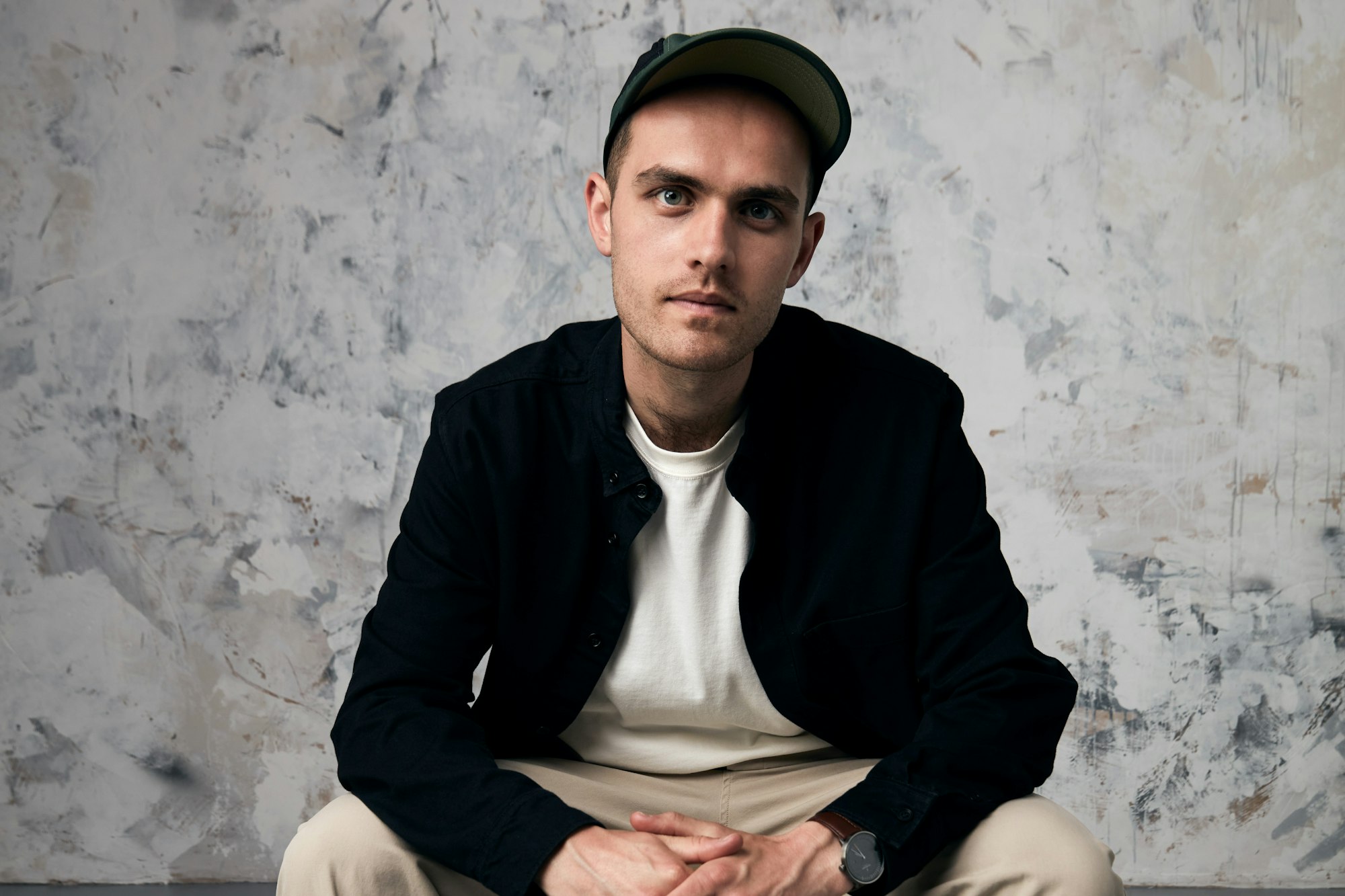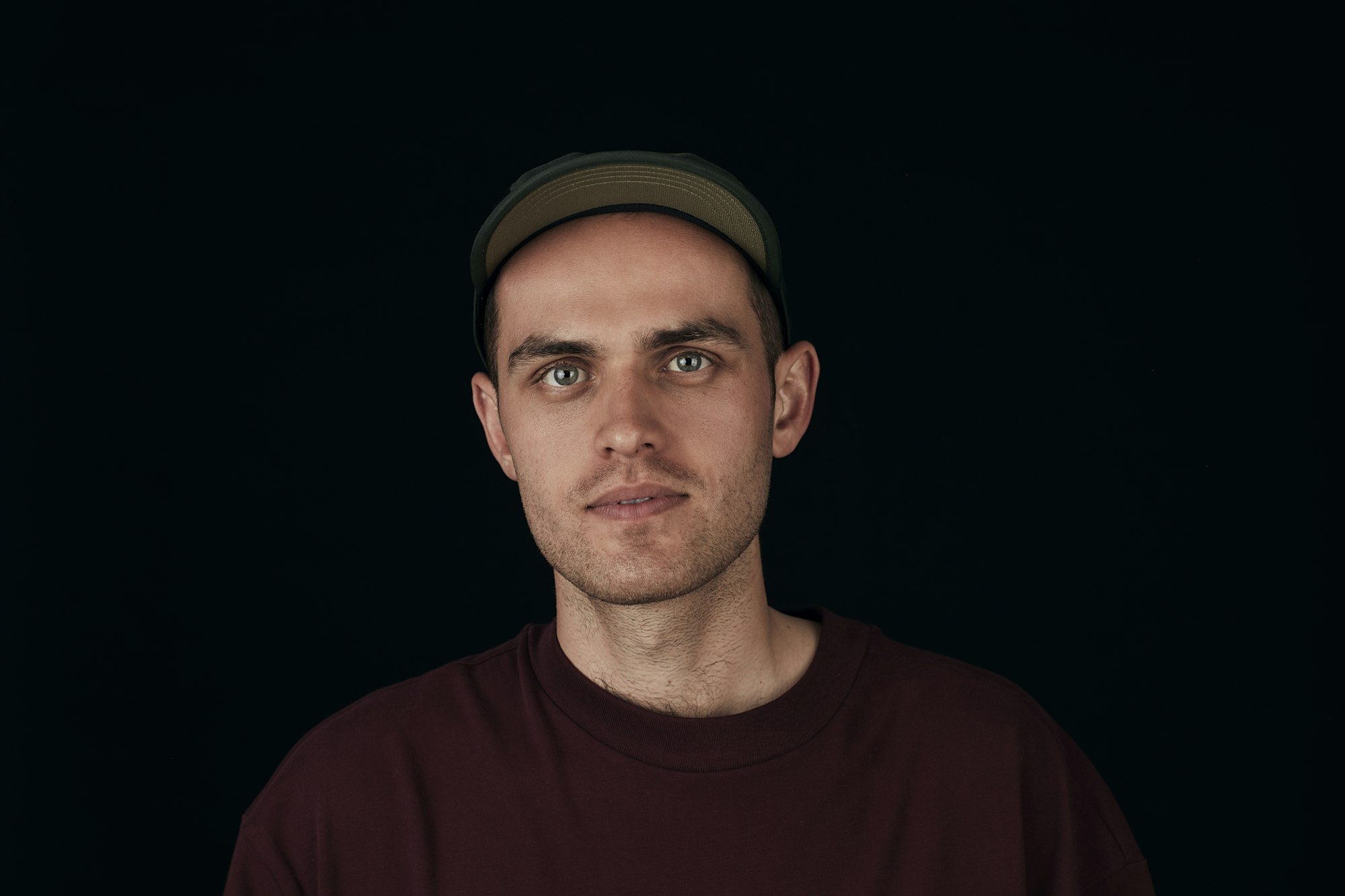Words by Simon Edwards
Jordan Rakei is a leading light in the jazz-infused, neo-soul circle that he calls home. After moving from Australia to London to pursue his music career, Rakei quickly connected with a number of the growing underground scenes the capital has to offer. His open-minded approach saw him bridging borders between the hip hop, jazz, and dance music communities across the city. Over the years he has collaborated with Loyle Carner, Tom Misch, Alfa Mist, and many more. The notorious jazz label Blue Note featured his groove-led cover of Donald Byrd on its Blue Note Re:imagined compilation, and his dancefloor alias Dan Kye allows him to move between the stage and the turntables effortlessly.
Rakei has always relied on solitude to fuel his creativity. As a self-taught producer and musician, he spent a huge part of his life locked away, honing his skills. But solitude has taken on a new meaning over the past few years. When it’s thrust upon you, the comfort you once found in solitude shifts, and the yearning for connection and community builds. But before he could let others in, Rakei needed a deeper understanding of himself. As a long-time practitioner of meditation, searching his inner-self seemed like a good place to start. It was this journey of self-discovery that lit the spark that became his new album, What We Call Life.
“It all started when I was standing on this beach in New Zealand. I was looking at the stars; it was my first time seeing the stars with no light pollution. It felt like I was getting swallowed by the sky. I just remember saying to my friend: ‘I’ve never really thought about the world being bigger than just you.’ He then told me about meditation. Being able to experience timelessness, mindfulness, and presence through your body, every day. It’s honestly changed my life: musically, in terms of my personality – I’m a lot calmer.”
If I think of an interesting creative idea, I just follow it down its road and follow my intuition. I allow the idea to express itself.
Meditation teaches you to not judge your thoughts – you must learn to acknowledge them and let them pass, without judgement. This method can be extremely beneficial for songwriting, as he explains: “Meditation allows me to judge my music a lot less. I’ll be playing the piano and a thought might come into my mind, and just like with meditation, you learn not to judge that thought or idea, you just let it come in and let the process take its course. If I think of an interesting creative idea, I just follow it down its road and follow my intuition. I allow the idea to express itself. There are many times in my life since I’ve started meditating where I talk about watching myself create. I let my self-consciousness do its thing.”
The positive effects of meditation pushed Rakei to search out new ways to focus his mind. This is how he stumbled upon Positive Psychology – a movement that began in the late ‘90s. The idea is to approach thoughts, feelings, and behaviour, by focusing on the strengths rather than weaknesses, growing the good in your life instead of repairing the negatives – an idea that instantly fascinated Rakei: “Basically, all the tools in Psychology are used to help troubled people become happier, but few people are using these tools as an advantage rather than an equaliser. When I was meditating, it felt like it was elevating me to a higher place, so I thought about what else I could do to become better.”
Therapy seemed to be the answer Rakei was looking for. What started out as an off-the-cuff experiment quickly became a life-changing experience. Something Rakei wasn’t ready for: “I went to the therapy session with a very happy-go-lucky mindset. I sat down with my therapist and she asked me about my childhood. I told her it was amazing: I had this amazing life where I was so happy – but then she started asking more specific questions. These stories started pouring out. By the end of the first session, I was like, holy shit! I relived all these traumas and phobias, and all this mental stuff I needed to work through. It was so enlightening.”
Compared to his previous albums, What We Call Life has a much more vulnerable quality, especially lyrically. Where he previously leaned upon metaphors, his new songs lay the cards out on the table for all to see. Therapy released a flurry of ideas and themes to explore in his new album, but Rakei still hadn’t put pen to paper – musically or lyrically. He had unlocked some intriguing doors through meditation, mindfulness, and psychotherapy, but it was now time to reach out to the people around him.

Working from a blank slate was a completely new writing style for Rakei, but after talking with jazz musician, and close friend, Alfa Mist, he was inspired to take a more free-flowing approach: “Just having his advice and his inspiration to choose a new way of recording was a game-changer.” Rakei packed his bags and headed to a recording studio in Wales, taking with him some musicians, an engineer, and all the drum machines and synths they could lay their hands on.
“I wanted the synthesisers to drive the process. In my entire career up to that point, I would write a song on the piano or a guitar and try to translate that idea, layering it with synths to give it an alternative feel. This time, I wanted to start with the synthesisers and work back from there. The music sounds fresh because of the electronic element but it also feels familiar, nostalgic. It has this ‘70s and ‘80s synth thing happening, but it’s also very futuristic in terms of the angular modular percussion and the electronic drum sounds.”
The prominence of synths and electronics gives What We Call Life a flavour Rakei’s solo albums haven’t revealed before. They highlight the brightness and joy within tracks like “Send My Love” and “Illusion”, but during the darker edges of the album, like on “Clouds'' and “Brace”, the synthesised sounds collide with soaring strings to take on a Radiohead-esque quality. The album’s more ominous moments feel as if you’re staring into the eye of a storm, knowing it’s going to tear everything in sight to pieces, but the spectacle is just too beautiful to turn away from.
Rather than tinkering away, alone on his computer as usual, What We Call Life embraces a much more collaborative creative process. And just like any collaboration, each member needs to know their role and when to interject or sit back. And for the first time in his life, Rakei took a very hands-off approach, at least initially:
“A lot of the tracks in the initial weeks I didn’t play any parts, and I’m usually the ‘play it all’ guy. I was just taking a step back and trying to hear all the parts – directing and selecting the parts I liked. It was a much more mature way of approaching music, in terms of being an external producer.” Rakei quickly found himself thriving in this open and experimental environment.
I’ve always wanted to create a tutorial-based community. My dream one day is to have a retreat where there will be meditation, music tutorials, guest lecturers, and speakers.
“It felt like a holiday because we’re all close friends. We drank coffee together and went for walks through the country lanes. It was a very fun time, but we were all really driven. We were working right through until 2 am. Because you’re paying for all these people to be there, and for the studio time, you feel the pressure to deliver something because it costs a lot. You can’t just lounge around, because you’re wasting money. We wanted to deliver at least two or three tracks a day. Everyone was on the same wavelength. Ideas were flowing and there was no judgement.”
The idea was to create a collection of instrumentals that he could go away and write to. A much more familiar process for Rakei. Once everything was recorded, he tinkered away on it throughout lockdown and tried to get his head around the hours of recordings.
“I did a lot of bold cuts: deleting full drum tracks, completely changing chords – trying not to get too attached to the original ideas. After the Wales trip, I went on tour for my album Origin. I was away for about four months, so I came back to the sessions with fresh ears. I spent about three months chopping and changing things around. I approached it as if I was remixing the original sessions.”

Finishing his album wasn’t the only outcome of Rakei’s lockdown experience. The long days of self-isolation brought him closer than ever to his fans. After creating tracks from scratch live on YouTube in the first few uncertain months of lockdown, he started a Patreon page to bridge the void that the pandemic had created.
“I’ve always wanted to create a tutorial-based community. My dream one day is to have a retreat where there will be meditation, music tutorials, guest lecturers, and speakers. I want to learn how to teach better, develop a community, and have a closer relationship with my fans.” His face lights up: “It’s made me realise how much I enjoy teaching and giving back. The connection with the fans is a special thing. Having this extra level of connection when I’m speaking to people about their music and how they can approach it, it’s so much deeper than the connection you get through social media. Having 5000 really dedicated fans is much better than having 100,000 fans that will just scroll past your new album post. It’s almost the opposite of going viral. It’s about building a grassroots community around your career.”
Looking back on his life and his insecurities allowed Rakei to push his anxieties and fears out of his mind and focus that energy on his music. Being more comfortable with himself allowed him to be more open with other people, giving Rakei the freedom to let go of creative control and embrace new ideas and influences. Rakei admits there is only so much he can bring to the table, musically. It’s this honesty that has made him a better songwriter, producer, and musician. Meditation and therapy aren’t for everyone, but if there’s one mantra Rakei wants people to take away with them, it’s this: Trust the process.
“Driving back from the first week in Wales, I remember thinking: ‘I can’t believe it actually worked.’ All my stresses about budget and coming away with nothing were gone. I came away from that first week with 12 tracks, all of which I liked and thought could make it to the album. I couldn’t believe that I might have written my album in a week.” He continues, “I had an epiphany: everything has changed from now onwards. My career and my creative process have now completely changed. I realised that the experiment had worked – the risk had paid off.”
